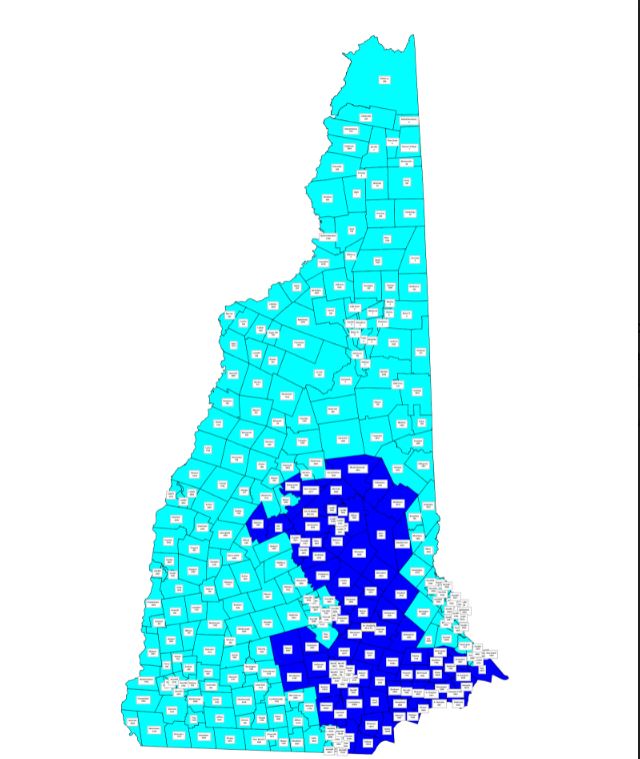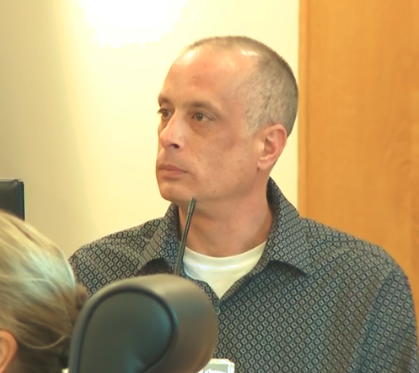By GARRY RAYNO, InDepthNH.org
CONCORD — The Republican proposed redrawing of the state’s two Congressional districts was soundly criticized at a public hearing by the House Special Redistricting Committee Tuesday.
Numerous speakers also took the committee to task for not following the state Constitutional requirement of towns with sufficient population receiving their own representatives.
Many people expressed concerns about the Republicans proposed redrawing of the Congressional Districts saying it is egregious gerrymandering that significantly changes the districts that have largely remained intact under Republican redistricting for 140 years.
One person testifying called the Republican plan “the very definition of gerrymandering.”
Many speakers said the congressional plan would dilute the votes of Republicans, Democrats and independents, and further increase the polarization of the state and country.
Under the Republican plan which would move a number of Democratic leaning eastern border communities into the 2nd District, while putting Republican leaning communities along the southern border in the 1st District.
The plan moves 75 communities and a quarter of the state’s population into different congressional districts, while the Democrats proposed moving one community — Hampstead — from the 1st Congressional District into the 2nd Congressional District.
Janet Ward of Hopkinton blasted the Republicans saying the plan serves one purpose and one purpose only, to create a seat that would always be held by a Republican.
“This is a raw display of political power and it is wrong,” Ward said. “What is the sense of holding an election if it is meaningless?”
Ellen Farnum of Tamworth said the two Congressional districts have swung back and forth over the years noting competitive districts help to unify the state and also produce the best candidates.
She noted with Republicans drawing the political boundaries over the past 140 years, there were no massive changes in the district compared to moving 75 municipalities into new districts.
“You will lose your credibility if you do not modify the Congressional plan,” she told the committee.
Others told the Republican committee members, the proposed change would be a short-term gain that will only further voters’ frustrations and confidence in the system.
Several people said the change in Congressional districts will tap down voter turnout of Republicans in the 2nd District and Democratic voters in the 1st District, which could lead to unforeseen consequences for the parties.
“I understand the difference between politics and partisanship and this map is both,” said Bev Cotton of Weare. “This is an egregious display of packing districts to ensure the outcome. This is exactly what this map does.”
Others called the proposal embarrassing.
But former Rep. Dan McGuire of Epsom, praised the GOP plan saying it would work to increase the state’s influence in Washington D.C.
“We are like a flea on a dog’s back,” McGuire said. “We are along for the ride so it behooves us to try to influence the United States as we can.”
The state’s first-in-the-nation presidential primary does increase the state’s influence as does the structure of the U.S. Senate with every state having two Senators, he said.
But in the U.S. House, McGuire noted, New Hampshire has little influence with two out of 436 members.
In order to increase influence House members need both to be in the majority and seniority to be part of leadership or committee chairs.
With a member of each party guaranteed from New Hampshire the state would have a majority member and having a safe instead of a competitive seat would make it easier to build seniority, McGuire maintained.
“So the majority plan improves the safety of the seats and ensures we will always have someone in the majority,” he said. But Gail Kenney of Canaan and a pastor with the United Church of Christ, said she views what is proposed through two lenses, “one moral and the other as a resident of a community robbed of its constitutional right to its own Rep.”
She noted the words of state Republican Party chair Stephen Stefanik guaranteeing there would be a conservative Republican member of Congress from New Hampshire after the 2022 election because Republicans control the redistricting process.
“The majority has become handmaidens of their leader,” she said. “We’ve never had this kind of gerrymandering before, never before and it is wrong. We have no recourse but to ask you, ‘Have you no shame?’”
Another major concern of the people testifying is the absence of single town districts, when communities with enough residents — 3,434 or more per House member — should have their own representative.
Many people argued the best representation is by members who live in the community, not have someone in the largest community of a multi-town district.
Maureen Quinn of Deerfield, said despite the stated goal of minimizing House districts, there are many examples where that was not done where it could have been like in her area.
There are two particular things that define New Hampshire, she said, the state’s motto, “Live free, or die” and the concept of local control.
“They are more than slogans,” Quinn said, “they are what makes New Hampshire unique.”
And the citizens have a right to have their voices heard and the best way to do that is having a representative from your community, she noted.
Yet the map drawn by the Republican members groups Deerfield with Auburn and Candia, two communities tied to Manchester, instead of with Northwood and Nottingham, which have closer ties to her town, Quinn noted.
She listed the commonality among the three towns like sending their children to Coe Brown Academy, sports leagues and other instances that Deerfield does not share with Auburn and Candia.
“These maps look very much like government interference.” Quinn said. “We’ve lost what makes New Hampshire, New Hampshire.”
Similar arguments highlighted House districts in Sullivan county that impact Grantham, Sunapee, Newport, Croydon, Cornish and Plainfield.
Other areas of concern are in Belknap and Grafton counties.
American Civil Liberties Union — NH staff attorney Henry Klementowicz said his organization hired an analytical firm to study the different proposals.
He said the Republican plan for House seats “over represents” the City of Claremont and “under represents” the City of Manchester.
He said the deviation from the one man, one vote concept approaches 11 percent which is above what is considered the acceptable cutoff of 10 percent and could be challenged in court.
He said there is also an issue of minority representation in Nashua where one minority group comprises about 14 percent of the city’s population.
And he noted the change in the state deviation overall would be from the mean .08 percent lean in favor of Republicans to 1.3 percent, while the change in Congressional districts represents a 6 percent shift, guaranteeing a Republican district and a Democratic district.
Another public hearing on the proposed plans will be held Wednesday beginning at 5 p.m. in Representatives Hall in the State House.
The proceedings are also on the House YouTube channel.
Garry Rayno may be reached at garry.rayno@yahoo.com.





